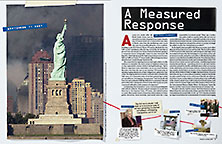 In his Law and Security scholarship, Richard Pildes, Sudler Family Professor of Constitutional Law, searches for alternatives to constitutional extremes. Consider his 2004 article, “Between Civil Libertarianism and Executive Unilateralism: An Institutional Process Approach to Rights During Wartime,” in which Pildes and co-author Samuel Issacharoff, Bonnie and Richard Reiss Professor of Constitutional Law, chart a course at odds with both the liberal advocacy of individual rights and the neoconservative ideal of judicial deference to presidential authority. The authors survey Supreme Court actions during wartime and surprisingly conclude that the justices have checked executive authority more often than conservatives recognize, but not through the individual-rights approach that liberals often urge. The Supreme Court has played this role by focusing on the procedural question of whether the president has obtained congressional approval for his actions.
In his Law and Security scholarship, Richard Pildes, Sudler Family Professor of Constitutional Law, searches for alternatives to constitutional extremes. Consider his 2004 article, “Between Civil Libertarianism and Executive Unilateralism: An Institutional Process Approach to Rights During Wartime,” in which Pildes and co-author Samuel Issacharoff, Bonnie and Richard Reiss Professor of Constitutional Law, chart a course at odds with both the liberal advocacy of individual rights and the neoconservative ideal of judicial deference to presidential authority. The authors survey Supreme Court actions during wartime and surprisingly conclude that the justices have checked executive authority more often than conservatives recognize, but not through the individual-rights approach that liberals often urge. The Supreme Court has played this role by focusing on the procedural question of whether the president has obtained congressional approval for his actions.
The notorious internment of Japanese Americans during World War II offers a provocative comparison to today’s controversies over “enemy combatants.” There is now broad consensus that the forced relocation of U.S. citizens of Japanese descent sprang from panic and bigotry rather than real danger. The Supreme Court of that era shares in the notoriety because of its 1944 ruling in Korematsu v. United States deferring to the authority of President Franklin D. Roosevelt and Congress. But largely eclipsed in constitutional memory is Ex parte Endo, wherein a unanimous court held that the continued detention of Japanese Americans was illegal. The justices distinguished between the two actions: first, the emergency military roundup of Japanese Americans, and, second, the political judgment to detain the internees for years without any proof of disloyalty. “On the day the two decisions were handed down together, the most immediate practical matter at stake was whether the detained Japanese would be released,” the authors note. “Under Endo, they were.” As far as Pildes is concerned, the high court demonstrated sufficient backbone “to resist executive branch actions that, at most, rested on political and policy, rather than military, judgments.”
Pildes suggests that by acting in this fashion, the judiciary can impose limits on executive power while leaving latitude for military decision-making. The Supreme Court has done just that, insisting that the conduct of the war on terrorism is not insulated from judicial oversight. The justices have upheld preventive detention of suspected terrorists at Guantánamo while insisting that detainees deserve to be tried under procedures approved by Congress. When the high court struck down the military commission system in 2006, Congress responded by passing legislation specifying how the commissions ought to work. In Pildes’s view, the judiciary has appropriately continued its role of channeling decisions to the “political branches,” while invalidating executive actions taken without legislative approval.
—
